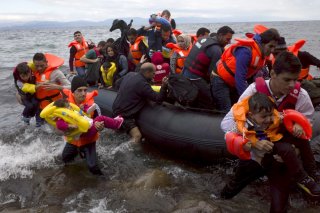Can the Middle East Fulfill Europe’s Security Provider Aspirations?
While Europeans are seeking to concentrate more on “hard” insecurities, “soft” insecurities across the Middle East—those not arising from military threats—are about to evolve into critical security challenges for states in the region and beyond, including the EU.
European scholars and practitioners are increasingly seeing Europe as a spectator rather than an actor. European Union (EU) high representative Josep Borrell, for instance, recently warned: “Europeans are at risk of becoming more and more an object and not a player in international affairs, reacting to other people’s decisions, instead of driving and shaping events ourselves.” With this perception, the EU has presented its bureaucrats with a Strategic Compass, which Borrell says “is no magic wand, but it is a guide for action, setting a direction.”
Although the text of the Strategic Compass has not yet been released, Borrell’s detailed elaboration in a press conference following the presentation of the draft text to EU ministers, as well as his article in Project Syndicate reveal this action plan is oriented toward challenges inside Europe and less proactive to the world outside its borders. In other words, the Strategic Compass seeks to improve the security resilience of the Union in its entirety, providing “answers for the EU to become a provider of security for its citizens, act faster and more decisively to protect [European] values and interests,” according to the factsheet provided by the EU External Action Service. Although the strategy has vaguely promised to contribute to international peace and security, it hints at reinforcing the EU’s already established partnership with the United States, NATO, and a number of like-minded countries, with no specificities.
Ahead of releasing the adopted Strategic Compass next March, EU external policy planners and bureaucrats should think about how the union is aspiring to become a geopolitical power and approach challenges and problems far beyond its territories and neighborhood. To exemplify, the Middle East and North Africa (MENA) region has been afflicted by sectarian tensions, armed conflicts, civil war, and aggressions. All these have already had severe impacts on Europe’s societal integrity and security fabric, but the EU has seemingly lacked the willingness, much less the sufficient capabilities, to address the Middle East’s struggles in that region, instead of contending with them once they spill over into Europe.
Hence, historical developments, as well as European words and deeds, suggest talking about the EU’s role as a security provider in the Middle East is null and void. Despite that, the emerging and deteriorating developments in the MENA region signal to EU leaders—particularly those who are in favor of having cohesive security policy such as the Strategic Compass—that providing security in this region means that they will be confronted with new forms of insecurities.
The MENA region has been witnessing critical non-military challenges including water, food, and environmental insecurities. In their paper for the European Union Institute for Security Studies, Florence Gaub and Clémentine Lienard argue that while the MENA region
…has contributed a mere 3 % of total global CO2 emissions over the past century and a half, it will be severely impacted by its effects … [I]n 2019, 13 of the world’s 20 most water-stressed countries were located [in the Arab world]. Climate change alone is not to blame: water mismanagement, too, plays a role, as well as demographic growth.
In addition to the Arab world, Iran has periodically faced protests over water scarcity; the latest round of brutal protests has unfolded since November 12 with no end on the horizon. In the meantime, an Iranian climate official has recently cautioned that the Persian Gulf will turn into the saltiest large water area in the world in the near future thanks to the littoral states’ water policies; Thus, no desalination plant in the Gulf Cooperation Council countries will be able to supply drinkable water to their citizens.
These negative developments, which are the tip of the iceberg in the Middle East and Persian Gulf regions, will result in escalation and internal conflicts in regional states as well as the new flow of climate refugees heading to Europe in the foreseeable future. While Europeans are seeking to concentrate more on “hard” insecurities, “soft” insecurities across the Middle East—those not arising from military threats—are about to evolve into critical security challenges for states in the region and beyond, including the EU.
What Europeans and the EU in particular can and should do is, first, to see such increasing non-military insecurities in the Middle East as part of their future security provider role under the Strategic Compass and, second, bring their decades-long capacities in the norm-setting and rulemaking to the fore aimed at finding collective multi-stakeholder answers to the rising insecurities in the region. The EU’s leading role in mediating and consensus-building on shared challenges will also positively contribute to the deteriorating diplomatic ties between countries. Equally important, it will also project a positive image of the EU to the hearts and minds of the people in the Middle East, who will see the Union as a genuine entity on which their countries can rely in addressing the soft insecurities their region is facing.
As it is called an “action plan,” the Strategic Compass enjoys capacities to address these challenges in the MENA region and elsewhere through norm-setting and partnership with regional states on transnational insecurities. Similarly to how Thomas Friedman recently predicted that the United States could reengage the MENA region through a sort of ecosystem diplomacy, the EU could and should seize the moment to provide security against non-military threats in the region, both deepening its influence and avoiding a new wave of (climate) migration to European shores.
Mahmoud Javadi is a postgraduate researcher in the School of Transnational Governance at the European University Institute (EUI) in Florence, Italy. His research focuses on EU grand strategy and European powers' Middle East policies. Twitter: @mahmoudjavadi2
Image: Reuters.

